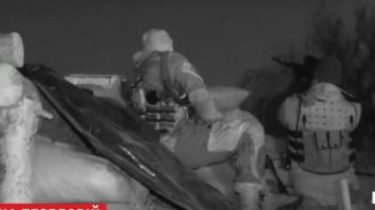Donbass syndrome: psychologists looking for a recipe for psychological recovery of the volunteers

Military psychologists note the importance of rehabilitation of the army, because the number of non-combat deaths in the army is growing. Tragedies occur to those who have served, but has not coped with the return to civilian life, according to a story TSN.19:30.
Demobilized Kostya came to visit a friend Alexis, with whom they’ve been through a war. However, the sister did not survive the everyday problems experienced all the hardships himself to himself, because in the village to go to a psychologist is not accepted. “He was in the 72nd brigade, was a year on the frontline, in the trenches, the dugouts, was under fire. And then broke it,” asks the fellow.
Videogenie psychologists are sounding the alarm over the increasing number of suicides in the army
TSN. 19:30
Today, 20:05
Could not stand Alex a quarrel with a neighbor who just came back from earnings from Russia. Between men fight was fastened, it postrazhdali and wife, which is now in a coma. Accused in atoshnik, so before the next visit to the police Department the man left a note and killed himself. “Help, please, People. I can’t anymore. Girls, help mom with Nastya. I love her very much. Dear, I’m sorry,” – read through her tears the farewell words of Alexei and his family.
Vladimir Pearls lost in captivity eyesight and hands, has a bunch of undertreated injuries, but he was able to overcome depression and return to life. He travels a lot, attending psychological training, visiting injured soldiers, he does volunteer work and even gathering of friends to celebrate the anniversary of the liberation. Now the man can remember the worst moment of his captivity. “I understand that I have amputated the hands, of view no, I’ve had some tubes sticking out, cut. When I was taken to the intensive care unit between operations was questioned. During the day I was treated by the doctors and in the night they walked, and began the interrogation. And I realized that I was afraid to give his friends, I didn’t want to be a traitor,” he said.
Wife Zhemchugova admits that has its own recipe for recovery husband. “Mom turned the position: because the son is to be pitied. And I included the position: you have to handle yourself,” she says. However, such cases are really rare, and problems of the army or demobilized much. Military psychologists in Ukraine is only beginning to emerge. Experts from the United States share with them their experiences, which in the most powerful army in the world, rehabilitation of servicemen and their families is top priority. “We are in the process of rehabilitation helping the soldiers to recover physically and mentally – we are in the same time derived from them very important information on how to improve the organization of the defense of our country”, – they explain.
See also:
In the Donbas shot 19-year-old security official, the suicide was connected with the “Blue whale”
Their achievements have military doctors in Israel. The soldiers often visited relatives of the war dead comrades, communicate easily on everyday topics, become friends. “It can start with in order to help his son in school. Children who are left orphans, we take them to amusement Park and other entertainment, in order to alleviate this tragedy,” says the local fighter Isaac. The Israeli experience is that every military unit takes custody of the victim family, and every soldier was also a volunteer who supports a family of his brother.
See also:
Suffering but smiling: new participants of the flash mob in the Network talk about depression and suicide attempts
But domestic military psychologists are convinced that the Ukrainians have to write your own recipe in the most difficult – mental treatment. And to delay it is not necessary, because every year new post-war “Donbass syndrome” occur new and new suicide. From the beginning of the war in the Donbas has killed himself due to PTSD more than 500 Ukrainian military. This was announced by the people’s Deputy and presidential adviser for humanitarian Affairs Olga bohomolec.
The TSN reporter Anna Bock